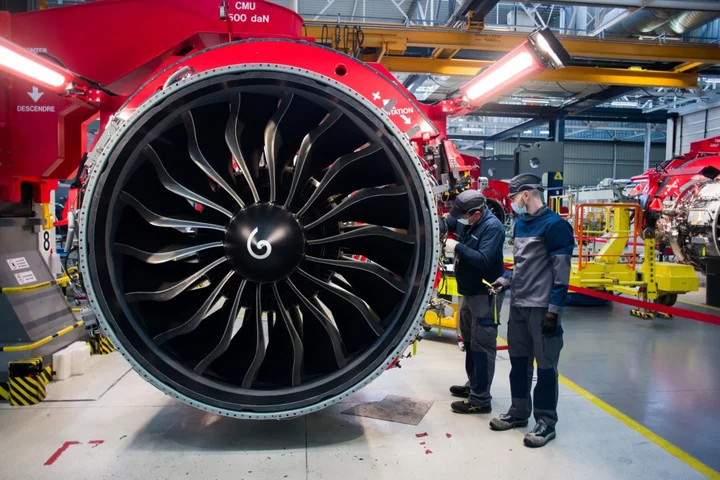The CFM International engine venture plans to to roll out design enhancements late next year to make its Leap model powering the Airbus SE’s A320neo and Boeing Co.’s 737 Max more durable in harsh, dusty environments such as India and the Middle East.
The General Electric Co.-Safran SA engine venture is redesigning the Leap’s high-pressure turbine blades and nozzles, executives told reporters in Paris on Saturday. They’re trying to minimize a deterioration in performance that’s afflicted the engine as well a competing turbofan from Raytheon Technologies Corp.’s Pratt & Whitney division.
“The first iteration wasn’t a perfect hit. Blade tech is one of the most complex things we do,” Karl Sheldon, an executive vice-president with GE, said.
The group plans to roll out the redesign in the second part of next year, executives said. Engine durability has emerged as a flash point for operators who have seen the new-generation models from CFM and Pratt require servicing sooner than expected. Coupled with a lack of components and engineers, that’s led to more aircraft on the ground than normal.
The Leap is the only engine of choice on the Boeing 737 Max, while the Airbus has the option of the Pratt & Whitney GTF and the Leap.
The components are among CFM’s most-advanced technology and use air cooling to operate in furnace-like temperatures that are above the melting point of metal. The engine venture has used supercomputing to optimize where to aim the cooling air flow, along with lab tests that mimic the dusty environments where the Leap operates.
The engine venture, which dominates the all-important narrowbody jet market, is in the midst of the most-aggressive ramp up in its history as it recovers from Covid and races to meet lofty production targets set by Airbus and Boeing. CFM has more than 10,000 engines in its backlog and is on pace to hike its annual output to 1,700 — 50% more than a year ago, said Gael Meheust, CFM’s president and chief executive officer.
The engine maker had been on target to build 2,000 Leap engines annually in 2020, when air travel collapsed as the Covid pandemic spread.
“I can’t stress enough the tsunami it created in our supply chain,” Meheust said.
Executives also provided more detail of the open-rotor engine concept, known as Rise, which is distinctive because it lacks the protecting casing around the fan blades. The aim is to bring the Rise to market around 2035 as Airbus and Boeing prepare their next-generation aircraft by then to replace their bestselling A320 and 737 families.
Earlier open-rotor concepts failed to catch on with customers because of concerns including noise to safety, such as the risk of a broken blade slicing through an airplane fuselage. In testing with Airbus, the Rise demonstrator has been producing less noise than the Leap, CFM executives said on Saturday.
(Updates with details of future-engine testing)

